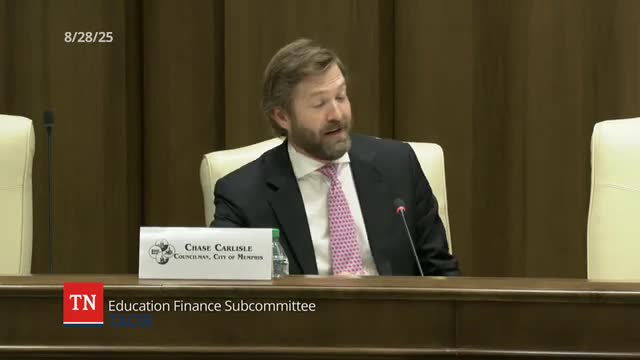Councilman Discusses Urban Hunting and Property Tax Incentives at Conservation Meeting
August 28, 2025 | TACIR, Deparments in Office of the Governor, Organizations, Executive, Tennessee
This article was created by AI summarizing key points discussed. AI makes mistakes, so for full details and context, please refer to the video of the full meeting. Please report any errors so we can fix them. Report an error »

The TACIR Education Finance Subcommittee convened on August 28, 2025, to discuss various issues related to property management and conservation in urban areas. The meeting highlighted the complexities of balancing property owner benefits with public interests, particularly in the context of tax incentives and conservation efforts.
One of the primary discussions centered around the indirect benefits to property owners who engage in conservation practices. A committee member cautioned against reducing eligibility for tax incentives, suggesting instead that the requirements for participation be improved. The member emphasized the importance of ensuring that public benefits are realized when property owners receive tax breaks, particularly in urban settings where land values and millage rates can be high.
The conversation also touched on the potential for a recapture mechanism, which would require property owners to return some benefits if they sell their land after making improvements. The member expressed concern that such a mechanism could discourage investment in property improvements, particularly if the future use of the land is uncertain. Instead, they advocated for clear requirements that would encourage property owners to contribute to conservation efforts, such as creating open spaces or engaging with local educational institutions.
Director Lippert responded to these points, acknowledging the committee's ongoing concerns regarding the Green Belt program and its fiscal implications. He noted that the commission could revisit the findings from a 2009 study on this topic, indicating that the issues raised remain relevant.
The meeting concluded with an invitation for further comments or questions from committee members, signaling an ongoing dialogue about the intersection of property management, conservation, and fiscal policy in Tennessee. The discussions underscored the need for careful consideration of how tax incentives are structured to promote both private investment and public benefit in urban environments.
One of the primary discussions centered around the indirect benefits to property owners who engage in conservation practices. A committee member cautioned against reducing eligibility for tax incentives, suggesting instead that the requirements for participation be improved. The member emphasized the importance of ensuring that public benefits are realized when property owners receive tax breaks, particularly in urban settings where land values and millage rates can be high.
The conversation also touched on the potential for a recapture mechanism, which would require property owners to return some benefits if they sell their land after making improvements. The member expressed concern that such a mechanism could discourage investment in property improvements, particularly if the future use of the land is uncertain. Instead, they advocated for clear requirements that would encourage property owners to contribute to conservation efforts, such as creating open spaces or engaging with local educational institutions.
Director Lippert responded to these points, acknowledging the committee's ongoing concerns regarding the Green Belt program and its fiscal implications. He noted that the commission could revisit the findings from a 2009 study on this topic, indicating that the issues raised remain relevant.
The meeting concluded with an invitation for further comments or questions from committee members, signaling an ongoing dialogue about the intersection of property management, conservation, and fiscal policy in Tennessee. The discussions underscored the need for careful consideration of how tax incentives are structured to promote both private investment and public benefit in urban environments.
View full meeting
This article is based on a recent meeting—watch the full video and explore the complete transcript for deeper insights into the discussion.
View full meeting
